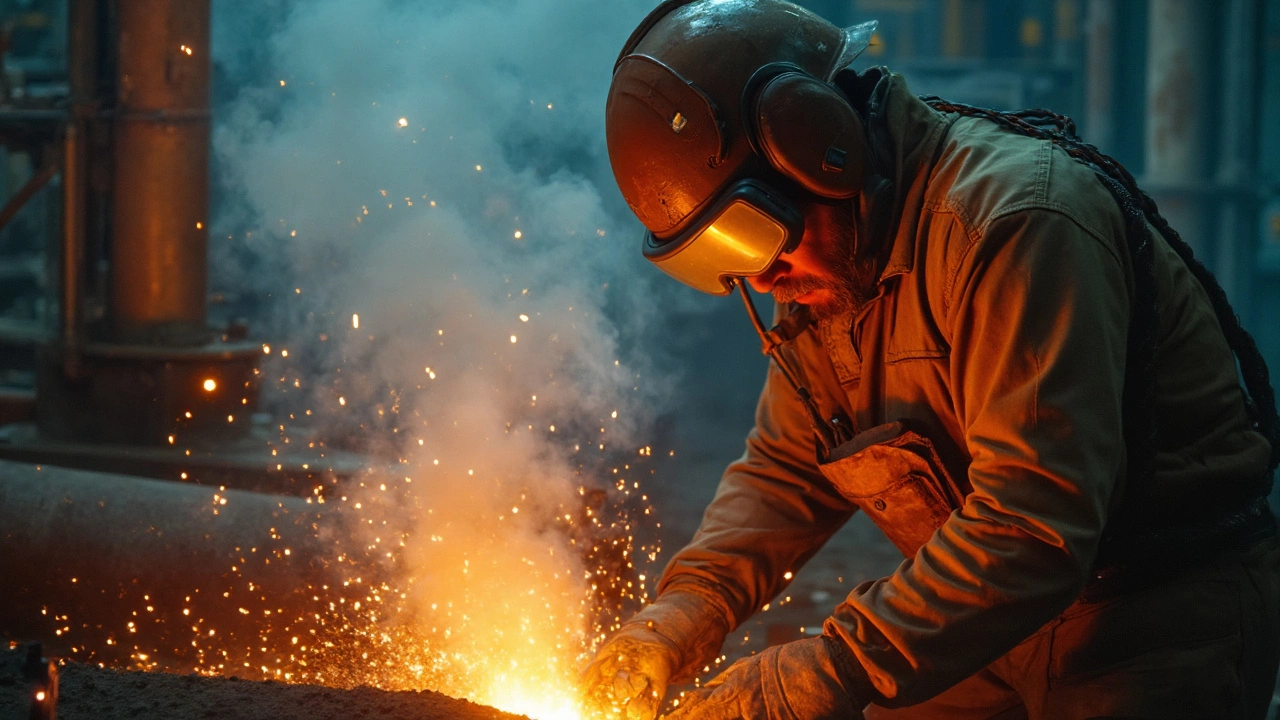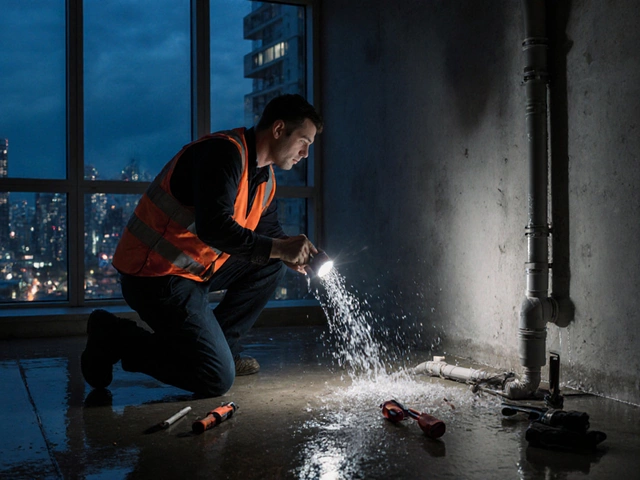Top-Paying Labor Jobs in Construction

If you've ever wondered who takes home the most significant paycheck on a construction site, you're not alone. It turns out, some of the industry's best-paid workers are the ones you might not expect. Sure, general laborers play a crucial role, but it's those with specialized skills who often snag the better salaries.
Take crane operators, for example. These folks aren't just hoisting steel beams—they're cashing in on a worthwhile hourly rate. If heights aren't your thing, consider becoming a boilermaker. Despite the grueling work, the pay can definitely make it easier to suit up every day.
Want to know what skills you'll need or how much you can earn? This article breaks it down and gets straight to the point. By the end, you'll have a clear idea of the top-paying gigs in construction and what it takes to land one. And hey, if you're dreaming about hitting that high-income mark, keep reading for tips on making it happen.
- Introduction to High-Paying Roles
- Specialized Skills and Training
- Salary Insights and Expectations
- Tips for Climbing the Career Ladder
Introduction to High-Paying Roles
When you're eyeing a career switch or gearing up to start fresh, looking into construction jobs can be a game-changer. While the industry offers plenty of roles, some truly stand out when it comes to the paycheck. But it's not just about grabbing a hard hat and picking up a hammer—specialized roles require more training and, often, a steady nerve.
Crane Operators
Among the high-paying labor jobs, crane operators are like the rockstars of the construction world. These folks are hoisting huge loads through the sky, and that requires some serious skill. The need for precision and the ability to handle pressure makes this a top-tier gig in terms of salary. Training-wise, you'll need a certification, and investing in that can really pay off in the long run.
Boilermakers
Then there are the boilermakers, who craft and install boilers and other large vessels. It's not just about climbing inside these giant constructions with a welder. The job demands physical endurance and technical knowledge, and employers are willing to pay handsomely for it. If you can stick with it, the financial rewards can be pretty impressive, making it a sought-after career in the construction companies.
Electricians
Don't overlook electricians, who light up the industry's earning opportunities. With the rise of energy-efficient systems and tech-savvy buildings, skilled electricians are in high demand. You'd need to complete an apprenticeship, but this investment pays dividends by the hour, especially with added overtime potential.
Here's a quick overview of the potential salaries for these roles:
| Role | Average Salary |
|---|---|
| Crane Operator | $63,000 |
| Boilermaker | $65,000 |
| Electrician | $60,000 |
These figures are more than just numbers—they're incentives to upskill and dive into specialized sectors. So, if you're aiming for a better paycheck, consider these top-paying construction jobs as your next career step.
Specialized Skills and Training
Stepping into top-paying construction jobs isn't just about raw muscle—it's about mastering specialized skills. The industry rewards specific expertise, as it's those skills that keep sites running smoothly and safely.
Crane Operators: Up in the Air
Operating a crane isn't for the faint-hearted. This role demands precision, focus, and technical know-how. Before you even touch a control panel, you'll need to earn proper certification. This typically involves classroom instruction and supervised operating hours. Add a keen understanding of physics, and you've got the makings of a prosperous career.
Boilermakers: Masters of Pressure
Boilermakers are the backbone of many industrial sites, constructing and maintaining pressure vessels. To land this gig, you'll want to complete a formal apprenticeship—usually four years of on-the-job training alongside classroom sessions. Proficiency in blueprint reading and welding techniques will set you ahead of the crowd.
Electricians: Powering the Job
Electricians are essential on any construction site, responsible for complex wiring systems. This role requires formal schooling followed by a lengthy apprenticeship, where you'll develop an understanding of codes and safety standards. Being detail-oriented and good with numbers certainly helps too.
Check out some basic certification requirements:
- Crane operators: Certification from a recognized body, such as the National Commission for the Certification of Crane Operators (NCCCO).
- Boilermakers: Completion of a registered apprenticeship program.
- Electricians: Licensing requirements vary by region, but typically involve a combination of education and apprenticeship.
Start Climbing the Ladder
Breaking into these specialized roles takes effort, but it’s a path full of opportunities. Beyond skills, staying updated on trends and technology boosts your value. Whether it's through additional courses or networking with industry pros, every step can bring you closer to those high-paying rewards.

Salary Insights and Expectations
So, you're eyeing those top construction jobs and wondering how big the paycheck could be? Let's dive into some actual figures that could help make your decision easier.
Crane Operators
Crane operators are often among the highest-paid on a construction site. These pros can pull in around $70,000 to $90,000 annually, and that's without moving up into a supervisory role. Training is essential here—if you're serious about this career, investing in a good training program and earning your certifications can substantially boost your earnings.
Boilermakers
Boilermakers might not get as much attention, but man, do they take home a nice paycheck. With salaries ranging from $60,000 to $80,000, it’s a job that rewards hard work and skill. Here, experience counts, and mastering the art of assembling and installing these large tanks makes a big difference.
Electricians
Electricians are the unsung heroes, keeping things safe and wired correctly. The pay is nothing to sneeze at, with yearly earnings from $55,000 to $75,000. But if you're willing to put in the effort to specialize in areas like commercial or industrial work, you could see that number jump.
Carpenters and Plumbers
Carpenters and plumbers might seem like standard roles, but they're anything but standard when it comes to salary expectations. Carpenters often earn between $50,000 and $70,000, while plumbers can make a bit more, thanks to the demand for specialized plumbing work, especially in urban areas.
Table of High-Paying Construction Roles
| Role | Average Salary |
|---|---|
| Crane Operator | $70,000 - $90,000 |
| Boilermaker | $60,000 - $80,000 |
| Electrician | $55,000 - $75,000 |
| Carpenter | $50,000 - $70,000 |
| Plumber | $55,000 - $80,000 |
These numbers could vary depending on the region, your experience, and the size of the project. But one thing's for sure: whether you're wielding a hammer or wiring up a megastructure, these roles offer a substantial financial reward for your labor
Tips for Climbing the Career Ladder
So you're eyeing that higher-paying role in construction but aren't quite sure how to get there? No worries, we've got some practical tips to help you stand out in the highly competitive field of construction jobs.
1. Get the Right Training
If you're looking into specialized roles like crane operation, proper certification is a must. Many schools offer short courses that provide both theoretical and hands-on training. Think of it as a small investment for a larger paycheck.
2. Network Like a Pro
It’s not just about what you know, but who you know. Building a network within the industry can open doors to opportunities not advertised publicly. Attend industry events and online forums to connect with potential employers and seasoned workers.
3. Experience Matters
Yes, classroom learning is essential, but real-world experience can break or make your career climb. Consider taking internships or apprenticeships to get your foot in the door. The more situations you’ve handled, the more you bring to the table.
4. Be Ready to Relocate
Sometimes it's about being in the right place at the right time. Construction booms in certain areas, offering better roles and salaries. Don't hesitate to move if an attractive opportunity comes up.
5. Keep an Eye on Trends
Construction is an evolving industry with new technologies constantly being introduced. Staying updated on these trends can make you a valuable asset.
| Position | Average Salary |
|---|---|
| Crane Operator | $60,000 |
| Boilermaker | $65,000 |
Looking for high-paying labor jobs? Then make sure to continually refine your skillset and stay informed about industry demands. The effort you pour into your career today can significantly increase your earning potential tomorrow.


